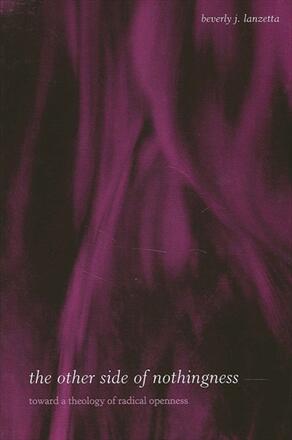
The Other Side of Nothingness
Toward a Theology of Radical Openness
Alternative formats available from:
Provides an innovative theology based in mysticism, one that acknowledges the pain of spiritual repression and values religious pluralism.
Description
From the mystic's experience of nothingness and the desert, The Other Side of Nothingness offers a theology of humility sensitive to religious pluralism and to the pain of spiritual oppression. With a passionate concern for contemporary interreligious issues, Beverly J. Lanzetta provides insight into how mystical consciousness overturns claims of dogmatic truth and prepares the self to experience the radical openness of divinity.
The work draws on a variety of Christian mystical texts, including those of Meister Ekhart, Gregory of Nyssa, Pseudo-Dionysius, Saint Teresa of Avila, Saint Bonaventure, and the anonymous author of The Cloud of Unknowing while also making reference to Buddhism, Judaism, Islam, and Hinduism and the thought of contemporary social mystics such as Heschel, Gandhi, Merton, Thurman, and Day. Lanzetta illustrates how the annihilatory mystical experience draws the seeker to a place beyond a tradition's self-understanding to new dimensions of the sacred and, in some cases, to new revelatory paradigms. It is here that she provokes our thought in her statement that the divine nature is itself pluralistic, non-absolute, and continually giving birth to new traditions. By showing how nothingness functions in mystical experience as a catalyst for the liberation of our hearts, we are brought to a vision of theology that is nonviolent and inclusive of all creation.
Beverly J. Lanzetta is Professor and Spiritual Director of Interfaith Theological Seminary, Research Associate at Southwest Institute for Research on Women, and the author of Path of the Heart.
Reviews
"Combining an understanding of apophatic language in theology and mysticism with a passionate concern for issues of social justice and interreligious engagement in the contemporary world, this book is a major and eloquent contribution." — Michael Sells, author of Mystical Languages of Unsaying
"This book tackles one of the most significant problems that the study of religion has raised today: How do we remain committed to our own religious tradition and at the same time remain open to the beauty and validity of other religions? Written from the heart, the work combines excellent scholarship with eloquent style. Fascinating reading for anyone interested in the spiritual dimension." — Harold Kasimow, coeditor of No Religion is an Island: Abraham Joshua Heschel and Interreligious Dialogue